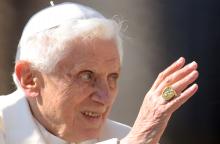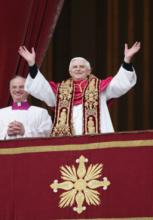college of cardinals

VATICAN CITY — The papacy of Benedict XVI came to a quiet end at 8 p.m. on Thursday, making him the first pope in 600 years to voluntarily leave office.
While there was no formal ceremony to mark the historic passage, the end of Benedict’s papacy and the beginning of the “sede vacante” interim period was clear when the Swiss Guards left their post at the gate of the papal summer residence in Castel Gandolfo.
The Swiss Guards are charged with protecting the pope. When Benedict ceased to be pope, his security was no longer in their hands. At the Vatican, officials sealed the pope’s apartment as prescribed by church law, and will destroy the pope’s ring and official seal in the coming days.

VATICAN CITY — The Vatican on Wednesday confirmed that Pope Benedict XVI is considering changes to church law regulating the election of a new pope, but stopped short of saying whether voting could start earlier than currently planned.
Pope John Paul II’s 1996 Apostolic Constitution “Universi Dominici Gregis” regulates what happens between the death or resignation of a pope and the election of his successor.
It stipulates that the conclave of cardinals must begin 15 to 20 days after the end of the previous pontificate.
But after Benedict’s surprise announcement that he will resign on Feb. 28, several voices within the church have asked for an earlier start to the voting to shorten the time the Catholic Church is left without a leader.